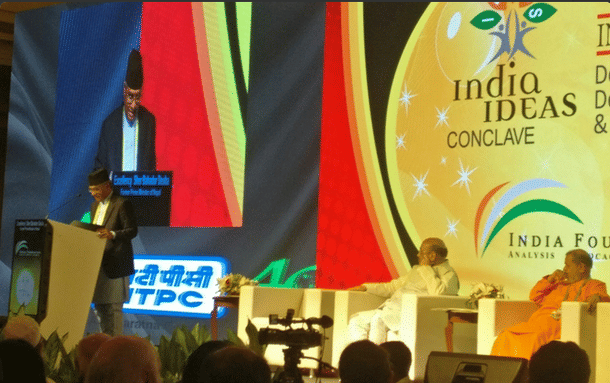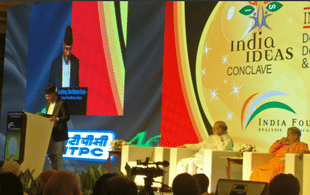Featured
Live Blog: India Ideas Conclave 2016
Swarajya Staff
Nov 22, 2016, 11:26 AM | Updated 11:26 AM IST
Save & read from anywhere!
Bookmark stories for easy access on any device or the Swarajya app.


India Ideas Conclave, a flagship program of the India Foundation, brings together noted intellectuals, policy-makers and political leaders from India and around the world. India Foundation is an independent think tank based in New Delhi that focuses on the issues, challenges and opportunities of the Indian polity. The 3rd edition of the conclave is currently underway in Goa.
We will be bringing you pictures, comments and other updates from the event, all in the blog below:
DAY TWO: NOVEMBER 5
9:30 AM - There is a need to take a fresh look at practices & procedures of Parliament after 70 yrs of Governance in India, says A Surya Prakash, chairperson of Prasar Bharati.
First Lok Sabha had over 35 % lawyers and about 10 % journalists, among others. Over the past 70 years democratisation and equalisation of the houses has happened. Committee system introduced in 1993 made the parliament accountable. Bad thing is that the MPs are becoming obsessed with privileges. We need to audit the performances of both the houses.
9:41 AM - Archana Chitnis, Ministry of Women and Child Development of Madhya Pradesh, is expressing views on Governance.
WCD Minister Madhya Pradesh Archana Chitnis Ji expressing views on Governance @70 @IICGoa2016 #IndiaIdeas2016 pic.twitter.com/fOis8fdZQW
— Ajay Dhawle (@AjayDhawle) November 5, 2016
10:00 AM- Election Commission should be given more teeth to enforce accountability and transparency in political parties, says Baijayant Jay Panda.
10: 11 AM- Himanta Biswa Sarma, Education, Health and Finance Minister of Assam, says:
We have yet not been able to reduce regional disparity in our nation. Many parts of the North-East still does not have geographical access. Time has come to create a situation where places of underdevelopment need to progress. Congress party needs to values of the country, not just the family.
10:35 AM- M J Akbar, Minister of State for External Affairs, says:
There is lot of conviction which defines Modi’s foreign policy; another defining feature is the ‘Balance of Power.’ The first concentric circle of any sovereign nation is the neighbor. Every single SAARC nation has given support to Prime Minister Modi.
Chairing the session on India Global @ 70 at the 3rd #IndiaIdeas2016 conclave in Goa pic.twitter.com/9sNJ8AF0AG
— M.J. Akbar (@mjakbar) November 5, 2016
11:02 AM- Daniel Twining, Director & Senior Fellow of the Asia Program at the German Marshall Fund of the United States, says:
US and India cannot succeed as island fortresses. The two countries need to work together to create a stable world order in order to continue developing. India and US both have stakes in the political affairs worldwide. China is thought to be the pace setter, but India and US as being multicultural pluralist societies.
11: 20 AM- Patrick French, a British writer and historian, says:
Foreign Policy needs to be aspirational, not just a transaction. Unlike many other nations such as Turkey, India has not banned anyone from speaking a different language.
11:38 AM- Ambassador James Tien regrets the lack of having good diplomatic relations between India and Taiwan.
India is the most diverse country I have worked in. Taiwan and India had relationship from 1947 till 1949 (ceased after communist takeover). PM Modi altered the image of India significantly in the globe.Taiwan also has a neighbor or rather a problematic relative watching over. Diplomatic offices were established in Taiwan and India in 1995. The offices have names that may make people think it’s either a electronic shop or a travel agency. 1143 Indians study in Taiwan as of now. Hopefully Taiwan’s ‘Watch South’ policy will match well with India’s ‘Look East’ policy.
1:05 PM- Dattatreya Hosabale, Joint General Secretary of Rashtriya Swayamsevak Sangh, says:
Essence of democracy is dialogue rather than dissent. Heated debate is not dialogue. Dissenting while having a dialogue is democratic. But when people disagree with the dissenting, they are branded intolerant. Essence of democracy is consensus-building. But even after seven decades, building consensus on issues like social justice and gender equality has eluded us. Academia and media have not played their desired roles in building consensus. Indians may be HIndus or Muslims, but are the children of the same civilization and inheritors of the same civilizational values. India’s contribution to humanity would be to show the world how to live harmoniously as one
1:25 PM- Maulana Mahmood Madani, former Member of Parliament, says:
Indian Muslims are Indians by choice not chance. Demand for an Islamic State itself is un-Islamic. If Muslims start following true Islam, there would be no need for dialogue regarding democracy as both are compatible. Talaq-e-biddat should be punishable.
3:25 PM- Jagdeesh Kumar, Vice Chancellor Jawaharlal Nehru University , says:
Earlier, while teaching electronics engineering, I always dreamed of integrated circuits and nanotechnology , since joining JNU all I hear is ‘dissent’, ‘freedom of expression’ and ‘revoluton.’Why our IITs do not rank higher in the global rankings? Do we know how politically and technologically biased these rankings are? Our society is donated by economists and technologist.
3:40 PM- Harsh V. Pant, professor of international relations at King's College London, says:
Barring a few, most of our universities are not doing what they are supposed to do: teaching, researching. Knowledge is going to be the key factor in global balance of power. Blatant politicization of academia has led to parochialisation of universities.
4:10 PM- An outstanding presentation by Mohandas Pai on higher education challenges and roadmap.
.@TVMohandasPai We are not putting money into content creation. All states should do this in their own languages #education#IndiaIdeas2016
— Swarajya (@SwarajyaMag) November 5, 2016
4:30 PM- It’s time for a picture.
With Honourable Dr. @davidfrawleyved at #IndiaIdeas2016 in Goa pic.twitter.com/G8HxeuXOL5
— Tufail Ahmad (@tufailelif) November 5, 2016
4:45 PM- Shekhar Gupta says that in larger context, foreign policy under Modi Government has become much more India centric
DAY THREE: NOVEMBER 6
Rupa Subramanya, eminent economist and commentator, says:
Social Media is actually the most modern and potent form of dissent. No more do I have to write ‘Letters To The Editor’ to express my opinions. No more is there a monopoly on opinion in the public sphere .
Social media is actually the most modern potent form of dissent.
No more do I have to read ‘Letters to the Editor’ to express my opinions.
No more is there a monopoly on opinions in the public sphere.
Nistula Hebbar is a journalist with The Hindu. She is speaking about mainstream media.
Mainstream media is not aloof from the ground realities.
The divide between social media and mainstream media is a bit exaggerated.
Mainstream media does have its integrity and does carry important stories.
11:25 AM - Kanchan Gupta, commissioning editor and commentator, ABP News, is speaking currently.
We often narrow social media down to twitter. Platforms like Facebook, Weibo and other such entities are of importance too.
The reason mainstream media still believes it has credibility is due to the media revenue business model staying the same.
This muzzling of dissent by the mainstream journalists is not new. In 1992, I remember many mainstream journalists petitioned many papers to stop taking writing samples from me and Swapan Dasgupta.
Often the social media issues range from either demonising Narendra Modi to uncritically praising him. At other times it is obsessed with bashing the four famed TV news anchors. Social media needs to go beyond either praise or criticism of the prime minister and ranting against the news anchors.
Mainstream media latches on to those stories from social media which advances its ideological positions.
Hindol Sengupta, editor-at-large, Fortune India, says:
I want to dissent against the ‘truths’, the pejorative labels that the so-called left-liberals throw at others. I come from West Bengal and I have never come across a leftist who is a liberal.
My second dissent is against history as it is told to us. In 2016, we quote Samuel Johnson, who equated patriots to scoundrels. He came from a civilisation which only conquered others and wasn’t defeated itself. Why in 2016, then, do we, for whose freedom the likes of Khudiram Bose and Subhas Chandra Bose gave their lives, are quoting Johnson?
There is only person who can define what your politics is. No one else can put a label on the kind of politics you practise.
Writer, economist, environmentalist and urban theorist Sanjeev Sanyal:
One way to break the dynasty stranglehold in every field, be it politics, law, media or Bollywood, is to groom outsiders through mentorships in all the fields.





